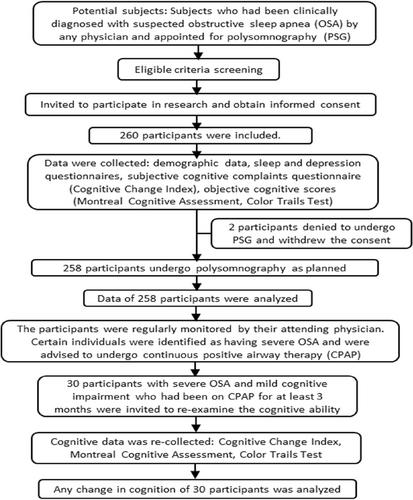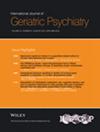Subjective cognitive complaints and objective cognitive impairment in patients suspected of obstructive sleep apnea who underwent polysomnography
Abstract
Objectives
Obstructive sleep apnea (OSA) is linked to cognitive impairment. We aimed to investigate subjective cognitive complaints (SCCs) and objective cognitive scores and their relation to polysomnography (PSG) parameters in patients suspected of having OSA.
Methods
A prospective cohort cross-sectional study was conducted at Siriraj Hospital. Patients suspected of OSA who were scheduled for PSG were recruited. Cognition was assessed using the Montreal Cognitive Assessment (MoCA) and Color Trails Test (CTT). The Memory Index Score (MIS) was calculated from the MoCA. Subjective cognitive complaint presence was assessed through direct questioning of patients and by employing the Cognitive Change Index rated by self or informants (CCI-I). Patients with severe dementia were excluded.
Results
Among 258 patients (mean age 61.46 ± 7.05 years, 51.2% female), the mean MoCA score was 23.89 ± 3.89. Based on PSG results, patients were categorized into groups as follows: those without OSA or with mild OSA (combined total of 20.1%), moderate OSA (28.3%), or severe OSA (51.6%). Cognitive Change Index rated by self and CCI-I scores correlated significantly (r = 0.238, p = 0.019) but not with the MoCA score or CTT time. Objective cognitive scores were associated with PSG parameters: total sleep time (TST), sleep onset latency, wake after sleep onset, sleep stages, mean O2 saturation, and time spent with SaO2 below 90% (all p < 0.05). Subjective cognitive scores were not associated with PSG parameters, except CCI-I with TST. Participants with objective cognitive impairment had lower education, higher body mass index, more comorbidities, and lower SCC percentage (all p < 0.05). Patients with moderate to severe OSA had a higher proportion of objective cognitive impairment (64.1%) but a lower incidence of SCC (38.3%) than patients with no OSA or mild OSA. Thirty patients with severe OSA and cognitive impairment received continuous positive airway pressure (CPAP) treatment for a mean of 12.2 months. These patients showed MoCA and MIS improvement, but no significant changes were observed in their CTT and Cognitive Change Index scores.
Conclusions
Most patients with OSA had objective cognitive impairment, but SCC was less frequent in patients with more severe OSA. Several PSG parameters correlated with cognitive scores but not with subjective cognitive scores. Patients with severe OSA may benefit cognitively from CPAP treatment.


 求助内容:
求助内容: 应助结果提醒方式:
应助结果提醒方式:


